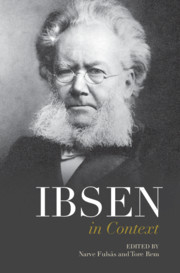Book contents
- Ibsen in Context
- Ibsen in Context
- Copyright page
- Contents
- Figures
- Contributors
- Preface
- Notes on the text
- Chronology
- Part I Life and Career
- Part II Culture and Society
- Part III Scandinavian Reception
- Chapter 13 The Ibsen Book
- Chapter 14 Publishing and Readerships
- Chapter 15 Criticism
- Chapter 16 Celebrity
- Part IV Internationalization
- Part V Afterlives
- Further Reading
- Index
Chapter 15 - Criticism
from Part III - Scandinavian Reception
Published online by Cambridge University Press: 23 April 2021
- Ibsen in Context
- Ibsen in Context
- Copyright page
- Contents
- Figures
- Contributors
- Preface
- Notes on the text
- Chronology
- Part I Life and Career
- Part II Culture and Society
- Part III Scandinavian Reception
- Chapter 13 The Ibsen Book
- Chapter 14 Publishing and Readerships
- Chapter 15 Criticism
- Chapter 16 Celebrity
- Part IV Internationalization
- Part V Afterlives
- Further Reading
- Index
Summary
Ibsen’s fifty years as a dramatist saw an ongoing professionalization in the literary field in Scandinavia. This included the development of literary criticism. The numbers of newspapers, critics and reviews increased significantly during the century, in conjunction with the numbers of published books and theatre productions. This chapter focuses on some of the highlights in Ibsen’s career from 1850 to the end of the century. As a playwright, Ibsen was both conventional and controversial, both traditional and radical, but mainly treated with respect. Among the leading critics we find Marcus J. Monrad, Clemens Petersen, Bjørnstjerne Bjørnson, Georg and Edvard Brandes and Carl David af Wirsén. The chapter outlines some of the reviews of Ibsen’s historical plays, his comedies and his contemporary dramas such as A Doll’s House, Ghosts, An Enemy of the People, The Wild Duck and Hedda Gabler. The field of criticism was dominated by men. This has influenced reception history and scholarly accounts, which until recently did not include female critics as part of the critical institution. The leading female critics of the time nevertheless contributed to establishing Ibsen’s works as starting points for discussions of existential as well as social and political issues.
- Type
- Chapter
- Information
- Ibsen in Context , pp. 127 - 135Publisher: Cambridge University PressPrint publication year: 2021



